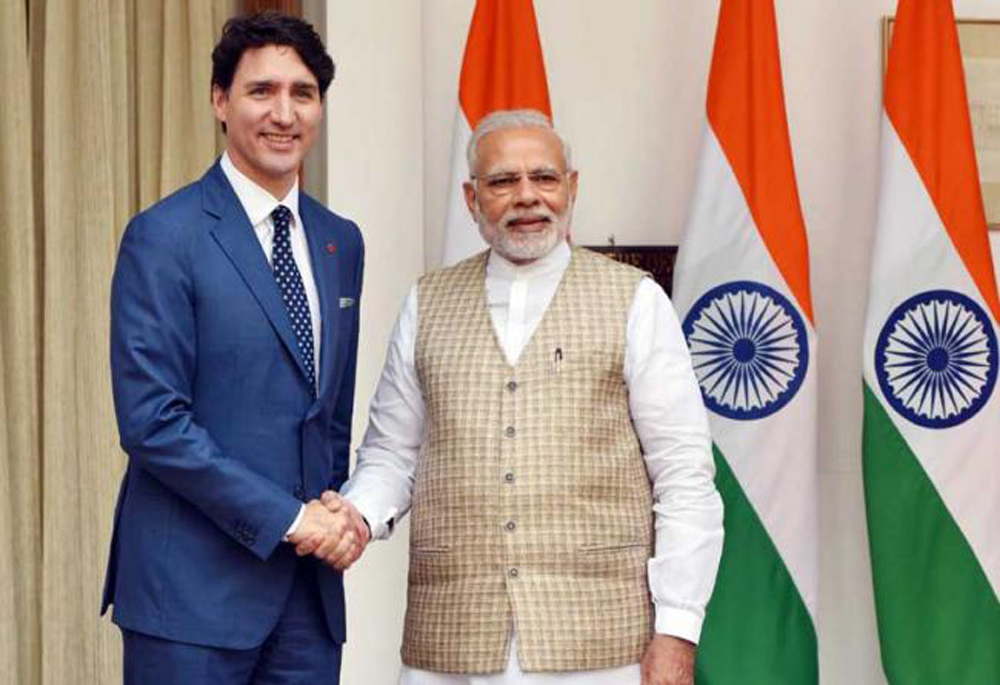Diplomatic tension between India and Canada has escalated after PM Justin Trudeau alleged New Delhi's role in the killing of Khalistani leader Hardeep Singh Nijjar this week, but anti-India incidents by the separatist forces have been occurring since the beginning of the year, leading to the present situation.
In March, the Indian government summoned the Canadian High Commissioner after Khalistani elements protested outside the country's missions and consulates in Canada.
The incident had taken place during a major crackdown launched by Indian authorities against Khalistani preacher Amritpal Singh in Punjab.
In a statement released at that time, the Ministry of External Affairs said: "It is expected that the Canadian Government will take all steps which are required to ensure the safety of our diplomats and security of our diplomatic premises so that they are able to fulfil their normal diplomatic functions."
Brampton Rally Row
In June, India had protested against a float, which was seen in a viral video on social media, that celebrated the assassination of India's former prime minister Indira Gandhi in the Canadian city of Brampton.
External Affairs Minister S Jaishankar then said Canada giving space to extremists and separatists on its soil is neither good for its bilateral ties with India nor for its own wellbeing.
Indira Gandhi was assassinated by her Sikh bodyguards, Satwant Singh and Beant Singh, at her official residence in New Delhi, on October 31, 1984, allegedly to avenge Operation Blue Star.
Gandhi had launched Operation Blue Star to remove Sikh separatist leader Jarnail Singh Bhindranwale and his followers from the buildings of the Golden Temple, the holiest site of Sikhism, in Punjab’s Amritsar.
The Canadian envoy to India Cameron MacKay even said that he was 'appalled' by the event.
"I am appalled by reports of an event in Canada that celebrated the assassination of late Indian Prime Minister Indira Gandhi," he had posted on X.
"There is no place in Canada for hate or for the glorification of violence. I categorically condemn these activities," he had said.
Taking a swipe at the Canadian government led by his own Liberal Party, the country's MP Chandra Arya slammed Khalistani elements for the same incident and posted on X: "Khalistan supporters in Canada have reached (a) new low with a despicable float in a recent Brampton parade. The float celebrated the assassination of Indian Prime Minister Indira Gandhi with her cutout in white saree soaked in blood and cutouts of her bodyguard turned killers brandishing and pointing guns."
Nijjar Killing
Khalistani leader Hardeep Singh Nijjar, the man around the current diplomatic tension between India and Canada, was shot dead in Surrey city, British Columbia province on June 18.
Canada's Integrated Homicide Investigation Team started the investigation into the incident. However, no arrests have been made so far.
Weeks after Nijjar's killing, a Khalistani organisation put out flyers that depicted Indian High Commissioner to Canada Sanjay Kumar Verma and Consul General Apoorva Srivastava as responsible for the terrorist's murder.
The two diplomats were described as "killers" in the pamphlets that announced a rally in Toronto on July 8, reports NDTV.
The Indian government had raised the issue with the Canadian authorities that time.
Khalistani issue featured during G20
During the G20 summit, Indian Prime Minister Narendra Modi expressed his deep concerns about the “continuing anti-India activities of extremist elements in Canada” during a bilateral meeting with Canadian Prime Minister Justin Trudeau.
The Indian foreign ministry issued a statement detailing PM Modi’s message to Trudeau, highlighting that extremist elements in Canada are actively “promoting secessionism and inciting violence against Indian diplomats, causing damage to diplomatic facilities, and posing threats to the Indian community and their places of worship.”
The statement also underlined the concerning nexus between these forces and organized crime, drug syndicates, and human trafficking, urging Canada to join efforts in addressing these threats.
Furthermore, PM Modi emphasized that a strong foundation based on mutual respect and trust is crucial for fostering a productive India-Canada relationship, according to the foreign ministry.
In response to these concerns, Prime Minister Trudeau acknowledged that he had discussed Khalistani extremism and “foreign interference” with PM Modi on several occasions over the years.
Trudeau affirmed Canada’s commitment to defending “freedom of expression, conscience, and peaceful protest,” while remaining steadfast in preventing violence and opposing hatred.
He emphasized that the actions of a few individuals should not tarnish the reputation of the entire community or Canada as a whole.
Trudeau also stressed the importance of upholding the rule of law and addressing foreign interference.
September escalation
This week, Justin Trudeau alleged that there are "credible allegations of a potential link" between Indian government agents and the killing of Nijjar in Surrey, British Columbia of Canada.
Soon after Trudeau levelled the allegations against the Indian government in the country's Parliament, Canada’s foreign minister Mélanie Joly announced the expulsion of a “top Indian diplomat” as a consequence.
In a tit-for-tat, India also sacked a Canadian diplomat and asked him to leave the country within the next five days.
India rejected the allegations made by Canada over the killing of Khalistani leader Hardeep Singh Nijjar.



